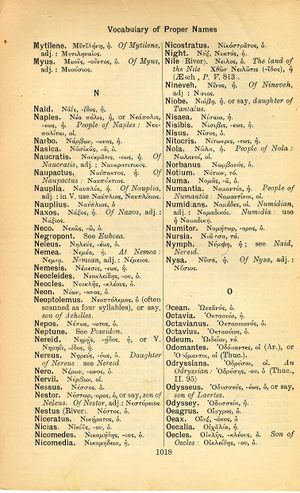Mytilene
Ζῶμεν γὰρ οὐχ ὡς θέλομεν, ἀλλ' ὡς δυνάμεθα → Ut quimus, haud ut volumus, aevum ducimus → nicht wie wir wollen, sondern können, leben wir
English > Greek (Woodhouse)
Μυτιλήνη, ἡ.
Of Mytilene, adj.: Μυτιληναῖος.
Latin > English (Lewis & Short)
Mytĭlēnē: (in later times Mĭtylēnē), ēs, f., and Mytĭlēnae, ārum, f., = Μυτιλήνη,
I the capital of Lesbos, the birthplace of Sappho, Pittacus, Alcæus, and Diophanes, the orator, now Mytilini or Castro.— Mytilene: laudabunt alii claram Rhodon, aut Mytilenen, Hor. C. 1, 7, 1; id. Ep. 1, 11, 17 al.—In plur. form, Mytilenae: Mytilenis an Rhodi malles vivere, Cic. Agr. 2, 16, 40; id. Fam. 4, 7, 4; Suet. Caes. 2; id. Aug. 66; id. Tib. 10; Caes. B. C. 3, 102, 5.— Hence,
1 Mytĭlēnaeus (Mĭty-), a, um, adj., = Μιτυληναιος and Μυτιληναίος, of or belonging to Mytilene, Mytilenean: mango, Mart. 7, 80, 9: vulgus, Luc. 8, 109: Theophanes, Tac. A. 6, 18.—As subst.: My-tĭlēnaei, ōrum, m. (sc. incolae), the inhabitants of Mytilene, the Mytileneans, Vell. 2, 18, 3.—
2 Mytĭlēnensis, e, adj., of or belonging to Mytilene: secretum, Tac. A. 14, 53.
Latin > French (Gaffiot 2016)
Mўtĭlēnē, v. Mitylene.

